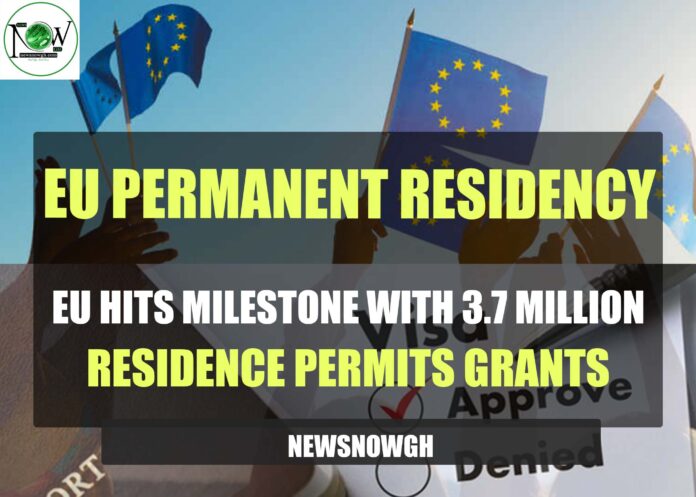EU Hits Milestone with 3.7 Million Residence Permits Grants | EU Permanent Residency
In 2023, the number of initial residence permits granted to non-EU nationals within the European Union (EU) increased significantly, hitting a record high of 3.7 million. The top justification for acquiring permits was still employment, which was followed by family and protection needs.
In 2023, the number of non-EU people granted first residence cards within the European Union increased significantly. According to figures issued by Eurostat, the EU Statistics Agency, the number of licenses increased to a new high of 3.7 million, showing a significant 4.7% rise compared to the previous year.
Employment Is Still the Main Cause
Work remained the main motivation for obtaining residency cards (33.8%) out of all of the permits issued. In contrast to 2022, there was a minor decline in this category of 0.4%.
Family and Safety Concerns Take Off
Family-related residency permits, which accounted for 26.4% (986,453) of all permits, were the second most prevalent, indicating a 6.4% rise. In the meantime, the percentage of licenses granted for international protection was 25.6% (956,646), indicating a 5.3% increase.
The Education Sector Is Growing Quickly
With a noteworthy 13.5% gain, the education sector saw the most expansion. Of all licenses issued, this group accounted for 14.3% (534,558).
Leading Nationalities Awarded EU Resident Permits
With 307,313 permits issued, Ukrainian people led the list of non-EU nationals given their first residence permits in 2023. Nearly behind with 281,279 permits, Belarusian nationals were followed by Indians, who secured third place with 207,966 EU residency permits.
Reasons by Nationality for Resident Permits
The primary reasons for residence permits varied greatly by nationality, according to Eurostat statistics, providing important insights into the range of trends and motivations that drive non-EU persons to seek residency in the EU.
- Employment: The primary justification for residence permits among citizens of Turkey (31.8%), Belarus (52.3%), India (45.2%), and Ukraine (71.7%) was employment, demonstrating the EU’s attraction to job seekers from these nations.
- International Protection: Syrian (77.3%) and Afghan (85.1%) nationalities were the most likely to get residence permits for international protection, which is not surprising given the ongoing wars and humanitarian needs that are driving migration to the EU.
- Family Reasons: The main justification for residency permits among Moroccan (50.3%), Russian (39.4%), and Brazilian (35.3%) people was family reunification, highlighting the EU’s assistance in fostering family ties.
- Education: The EU is a top choice for Chinese students seeking higher education and academic prospects, as evidenced by the fact that the majority of residence permits granted to Chinese nationals (37.8%) were obtained for educational purposes.
Germany Leads the EU in Issuing Resident Permits
First residency permits increased significantly in 2022 (up 26% from 2021 to 2022), hitting levels not seen since 2009. This was reported in the 2022 Eurostat report. Of the permits awarded that year (243,617), 42% were for work-related activities, an increase of 18% over the previous year.
In the EU, Germany issued the most residence permits (538,690), followed by Italy, Spain, and France (337,788, 324,200, and over 300,000 visas, respectively).
Final Thoughts
The EU is becoming a more popular destination for non-EU nationals looking to settle in the EU for a variety of reasons, as evidenced by the spike in residence permits, which also shows the EU’s continued need for skilled labor, family reunification, and protection.
Follow us on Newsnowgh.com to stay updated on the latest information regarding work permits, visa application processes, paths to permanent residency, and visa-sponsored employment.


